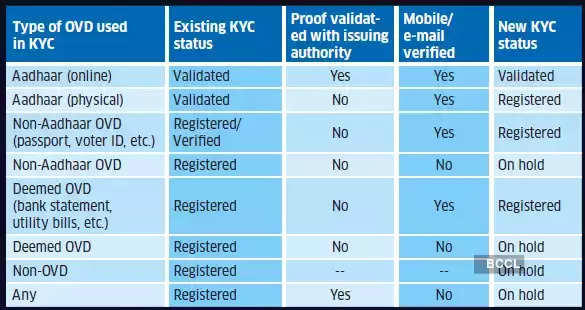New KYC rules for mutual fund investors: Are you a mutual fund investor? You may need to update your KYC once more! New KYC rules starting from April 1st mean millions might need to update their information or risk not being able to make transactions.
According to ET, many investors are finding out that their current KYC status is no longer valid. The validity depends on the identity or address proof provided during registration. The regulator now accepts a narrower range of officially valid documents (OVD) like Aadhaar, passport, and voter ID, excluding previously accepted documents such as bank statements and utility bills.
Read More: MobiKwik’s Pocket UPI: Here’s how you can use it to make payments without linking bank accounts
If your KYC was done with non-OVD documents or if your email/mobile were not verified, your status would be put ‘on hold’. In such cases, you won’t be able to make transactions, including for existing SIPs or new investments, or redeem money.
These investors need to undergo a new KYC process by submitting any of the officially valid documents to a mutual fund house, KYC Registration Agency (KRA), or mutual fund platform.
Amol Joshi, Founder of PlanRupee Investment Services, said that all investors with KYCs on hold must complete the process again. Once their KYC status is updated to ‘validated’, they can resume transactions.
Also, many other investors hold a ‘KYC registered’ status. These investors completed their initial KYC with either physical Aadhaar or a non-Aadhaar OVD (which couldn’t be validated by the issuing authority), but their mobile numbers and email IDs have been validated by the KRA. While they can transact with fund houses they already have accounts with, newer fund houses remain inaccessible to them.
To access all fund houses, these investors need to obtain a ‘KYC validated’ status for their mutual fund investments. This requires submitting officially valid documents as proof of identity/address. They can request this modification through the KRA or mutual fund portal. If done through any one fund house, the updated KYC will apply to all mutual fund investments linked to the PAN.
Read More: Is Aadhaar mandatory for Small Savings Accounts – PPF, SCSS, SSY?
KYC challenges for mutual fund investors
Investors are finding that KYC issues are more complex than expected. Even if they had previously submitted updated officially valid documents (OVDs), their KYC could still be considered invalid. Mahesh Mirpuri, a mutual fund distributor, notes that many KRAs struggle to validate KYCs even when investors provide Aadhaar or passport as identity proof. If you use an OVD other than Aadhaar, you’ll need to redo KYC each time you invest with a new fund house.
Furthermore, different KYC Registration Agencies have varying lists of acceptable officially valid documents, which affects the validation process.
For example, while KFintech accepts a driving license as an OVD, CAMS does not. Attempting a re-KYC or KYC modification can be quite challenging. Distributors and financial advisers highlight numerous issues with redoing KYC. Firstly, investors whose PAN and Aadhaar are not linked cannot update their KYC; linking the two is necessary before any modifications are permitted. Secondly, some KYC modification requests are rejected due to minor discrepancies like differences in upper and lower case usage in names or addresses. This often results in multiple rounds of KYC modifications for validation.
Even when conducting the process online, investors may encounter obstacles. Amol Joshi remarks, “Even the online KYC is broken.” He cites a case where a client’s online KYC modification request was rejected due to ‘unmasked’ Aadhaar and an ineligible address. Joshi questions why KYRAs can’t mask Aadhaar in their records instead of keeping the KYC on hold. Senior citizens and DIY investors, lacking intermediary support, may face challenges in sorting out KYC issues. Mahesh Mirpuri finds the current KYC rules peculiar, questioning the relevance of email IDs in KYC. He wonders why Aadhaar-based KYC doesn’t recognize a bank statement as identity proof, despite Aadhaar accepting it.
Recent KYC changes and continuing challenges for mutual fund investors
Starting from April 1, your KYC status might have become invalid depending on the type of proof you submitted, among other factors.

Prominent figures in the mutual fund (MF) industry have voiced frustration regarding the chaos surrounding KYC. Nilesh Shah, MD of Kotak Mutual Fund, expressed his exasperation after receiving an email from a KRA putting his KYC ‘on hold’. He shared his sentiments on his X (formerly known as Twitter) social media handle, stating, “After three decades in the market and filling every form for KYC over the years, including biometric verification, my heart pains to receive such an email. How many times does the KYC need to be done? Clearly, our KRA agencies/Registrar can do a better job.”
Radhika Gupta, MD and CEO of Edelweiss Mutual Fund, also shared on X, “KYC is a problem crying to be fixed as of yesterday. In a world where we have Aadhaar and some of the best digital public infrastructure in the world, it also seems very doable.”
MF investors’ KYC troubles persist. After April 30th, KRAs are set to begin verifying inconsistencies between KYCs and PANs of unitholders. Any discrepancies in the name or date of birth between the PAN and MF folio could lead to issues. Joshi cautions, stating that we should expect more KYC-related challenges when MFs validate the name and date of birth in folios against the provided PAN.
Despite the KYC process’s flaws, investors should prioritize resolving it quickly to prevent their funds from being frozen when needed.





































